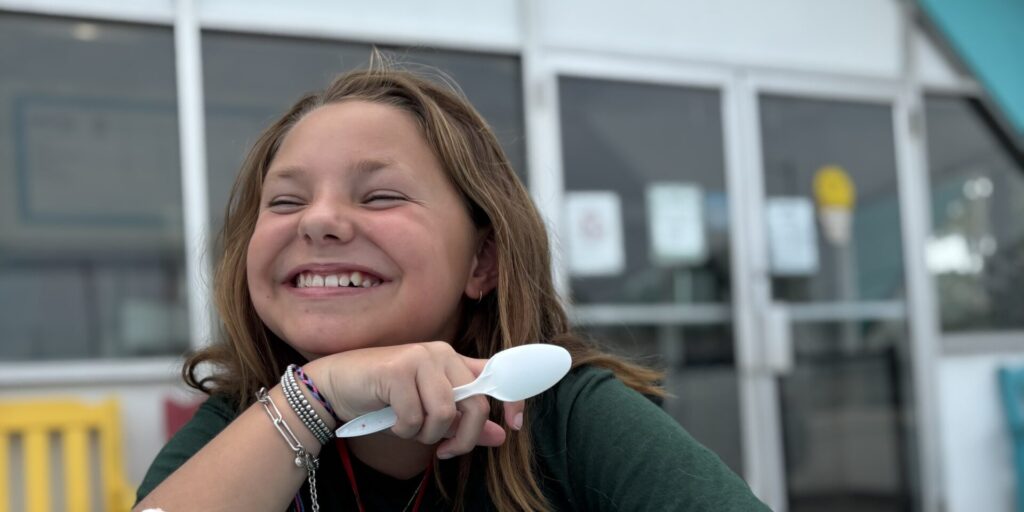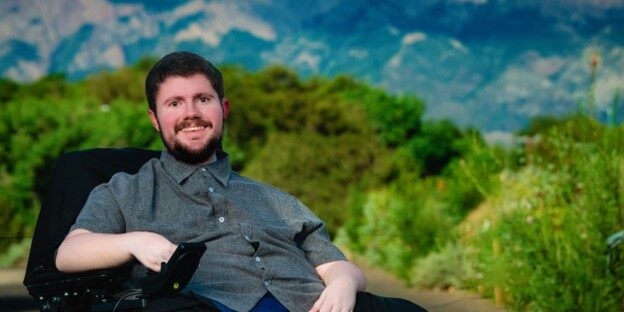
MDA Ambassador Guest Blog: Resetting Priorities: A PhD’s Journey
By Dr. Tye D. Martin | Friday, October 4, 2024
5 Second Summary
MDA Ambassadors play an essential role in furthering MDA’s mission while representing and empowering the neuromuscular disease community. Quest Ambassador Guest Blog series provides a platform to share their personal stories, perspectives, and experience.
Dr. Tye Martin is a digital creator, influencer, and disability advocate living with muscular dystrophy. He earned a PhD in Biomedical Engineering from the University of New Mexico in 2019. In 2021, Tye was forced to press a life “reset button” following gallbladder surgery. He has since launched a social media presence on Instagram (@dr.tyedmartin) where he creates and shares content important for disability awareness as well as content focusing on other aspects of his life other than his disability. He currently works with two nonprofits, as a board member with Laughing at My Nightmare, Inc. and as an ambassador for the Muscular Dystrophy Association (MDA).
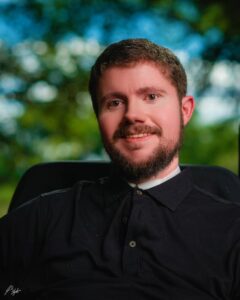
Dr. Tye D. Martin
Growing up in rural New Mexico with muscular dystrophy had its share of ups and downs, including occasionally peeling out in my three-wheeled motorized scooter. At times I felt like I was driving a miniature motorcycle, weaving through desks and chairs (sometimes “bumping” through) on my way to becoming valedictorian of the Estancia High School graduating class of 2007. Collegiate coursework and laboratory research at the University of New Mexico in Albuquerque brought a host of new challenges as I completed my bachelor’s, master’s, and doctoral degrees in Chemical and Biomedical Engineering. In 2019, after defending my thesis with honors and earning my PhD, I took a month off to visit my sister and brother-in-law in Tennessee. By September, I was plunging back into academic research as an NIH funded postdoctoral fellow. Nobody, including myself, would have believed how drastically life would change a year later when COVID-19 entered the picture.
Truthfully, even prior to the pandemic I was beginning to feel the strain of research, grant writing, teaching, and training to become a professor. During the height of the pandemic in 2020 and 2021, that struggle escalated as I dealt with severe burnout that was worsened by the isolation and pressure to be more productive. I think much of this pressure was self-imposed, because I felt that the additional time at home should lead to more productivity. Unfortunately, my disease progression advanced and I began feeling severe discomfort when sitting in my wheelchair. I couldn’t sit comfortably for more than 15 minutes without adjusting my position. The fall of 2021 is when my system reached overload. I experienced heavy mucus and phlegm levels that began taking away my ability to talk. You can imagine how disruptive the combination of these symptoms became during a stage of my career when I needed more and more time to succeed as a professor in training.
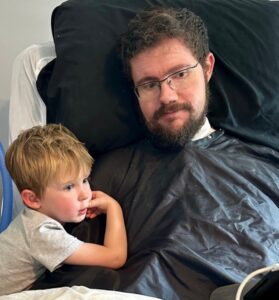
Tye and his nephew, Nathan, intently watching the Disney movie Cars!
The holiday season was rapidly approaching, and my family and I were ecstatic to be planning for my nephew’s first Christmas visit to New Mexico. On a Saturday morning roughly a week and a half before Christmas day, I transferred into my wheelchair with my dad’s help. I started feeling dizzy and more weak than usual, so my mom checked my oxygen level. Upon seeing the reading below 60, my parents called 911. The last thing I remember is the deep breath of oxygen coming from the tank that the paramedic gave me before blacking out. I woke up to a hospital room and realized I was intubated with a feeding tube. I found out my gallbladder had turned septic and had been removed. It was my first surgery.
Countless challenges, from a tracheostomy to a hairline hip fracture, made recovery nearly impossible – especially since I initially had no way to communicate with doctors or nurses. No one had any idea how to work with someone who had muscular dystrophy in the ICU. For example, I experienced excruciating pain up and down my legs when the nurses turned me side-to-side because of my contractures. A long list of medications including a blood thinner that actually caused clots to form in my left arm and fentanyl for pain relief brought more issues. As an optimist (almost to a fault at times), I was accustomed to finding silver linings in difficult circumstances – but there were moments in the hospital where I hit rock bottom.
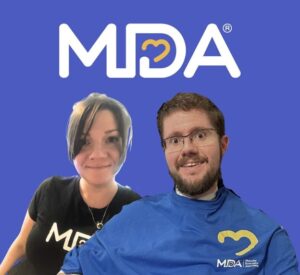
Tye and his friend (and fellow PhD) Marilyn Nicol who he first met on Instagram upon starting his social media journey during an MDA awareness event.
A turning point occurred, when after a week or two, one nurse finally realized I was motioning to write a note to communicate with her. I could actually explain why I was uncomfortable and self-advocate again. My doctors approved my request for my parents to alternate staying with me and we were able to train my nurses how to turn me less painfully. As I gradually regained small amounts of strength, I began to consider what my life would look like if I was ever able to leave. After forty days in intensive care, I was finally able to move back into my house – and that is really when my recovery truly started. Therapy, speech valves, portable ventilator care, eating solid food, driving my wheelchair, and pain management dominated my and my parents’ time. Eventually, around June or July of 2022, I decided that it was time for me to jump back in and explore social media while also taking time for focusing on my mental health needs for the first time.
I made the decision to diverge from my original career path in biomedical engineering research, but to continue in academia through sharing knowledge of science and engineering as applied to spreading awareness neuromuscular disease. I also began working part time in the area of critical disability studies focusing on higher education, ableism, and disability service policy.
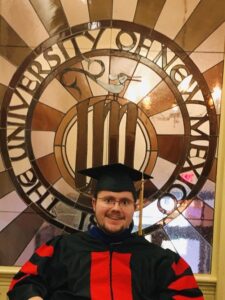
Graduation photo of Tye during the PhD commencement ceremony at the University of New Mexico in 2019.
Academics was, and in many ways still is, a part of me that I apply to other aspects of my life to this day, but it’s no longer the primary focus. Since the events surrounding my surgery and symptom progression over two years ago, I’ve had the opportunity to share my story with the Instagram community, resulting in amazing new friendships and connections. Volunteer work and advocacy with nonprofits, including Laughing at my Nightmare, Inc. and MDA, have allowed me to begin helping others living with neuromuscular disease, which is something I wasn’t able to even consider when I was a postdoctoral fellow. When I look at the current landscape of disability inclusion and the many challenges that need attention, I realize the unique position I am in to use everything I’ve learned through almost 36 years to make a difference. The stigmatizing nature surrounding our community and the prevalent lack of empathy have my constant attention now. Although I am traveling a different path than the one that I originally set out on, I don’t regret my journey to becoming Dr. Tye D. Martin, PhD. I had the honor and privilege of working with so many folks at the University of New Mexico, many of whom are still an important part of my life. As a friend and former mentor once told me: “A PhD is a plane ticket to fulfill your true passion and purpose.” And I have found both in advocacy and a commitment to empowering others in the community.
Next Steps and Useful Resources
- For more information about the different types of Muscular Dystrophy, a full list of diseases can be found here.
- To learn more about how muscular dystrophy affects the ability to carry out everyday activities, see Simply Stated: What is Muscular Dystrophy?
- MDA’s Resource Center provides support, guidance, and resources for patients and families, including information about exon skipping therapies, open clinical trials, and other services. Contact the MDA Resource Center at 1-833-ASK-MDA1 or ResourceCenter@mdausa.org.
- To learn more about MDA’s Mental Health Hub, visit here.
- Listen to a Quest Podcast conversation with Isaac Banks, an author and public speaker, about finding personal fulfillment.
- Stay up-to-date on Quest content! Subscribe to Quest Magazine and Newsletter.
Disclaimer: No content on this site should ever be used as a substitute for direct medical advice from your doctor or other qualified clinician.


